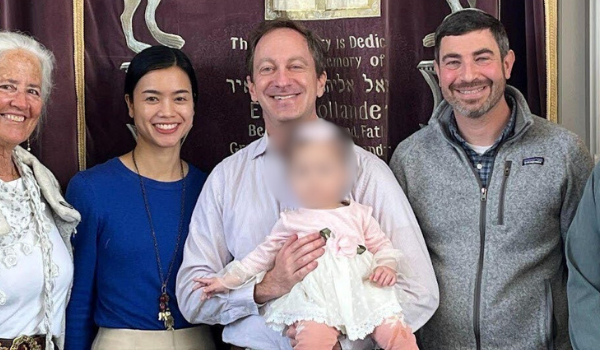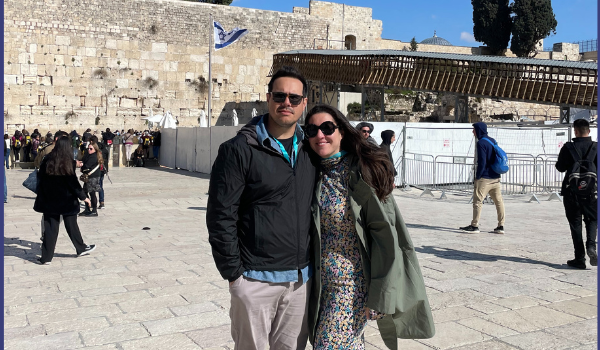July 28, 2017
By: Leah Kaplan, Honeymoon Israel DC participant on a October 2015 trip
For those of us struggling with questions about fertility, one of the most unexpected and challenging aspects can be a sense of judgement that comes with it. Or maybe worse, self judgement. When we hit our thirties, that judgmental lens can make us wonder if we didn’t take our fertility clock seriously enough. Or we feel labeled as a “career woman”, as if we’ve valued our careers over family. Or that we’re picky or not taking the right steps.
We don’t create these feelings out of nowhere; the media is plastered with wonderful images of pregnancy, we see happy families on Facebook, and ecstatic friends announcing their pregnancies, all making it sound easy. We are thrilled for them while feeling alone in that we haven’t yet joined them in parenthood. In many cases, we haven’t even talked about what’s happening in our own private efforts to do so. While this may feel very lonely, I’m here to tell you that we are far from alone.
Unlike many women, I have been “blessed” with the prior knowledge that getting pregnant wasn’t going to be easy for me. So much so that I’d convinced myself that I might not want children; that I was lucky to have found a loving partner to spend my life with and have a good job that’s fulfilling and would afford me a lot of fun things to do with my life if I didn’t have kids to tie me down. I was happy picturing my life traveling around the world, getting a nice house, and finding a community to be active in. But after our Honeymoon Israel trip, all my friends started getting pregnant. Literally half or more of my group was pregnant. And for the first time I wondered if I could. So I talked to my doctor and he told me he thought I had a good chance if I did fertility treatments. I didn’t believe him so I made an appointment with a fertility clinic to see what they had to say. I was shocked that they said the same thing. My vision of an ideal weekend changed from long hikes with my husband and dog, to long hikes with my husband, dog, and baby in tow.
But then came the fear. What would fertility treatments do to my body? Would I have to spend all of my retirement savings on getting pregnant? What if I tried everything and nothing worked? And then the self-judgment: why do I have to go through this, does that make me less of a woman? What will I do when I get the judgmental questions from the incessant cousin, co-worker, and parent when they ask, “So are you planning on having kids?”? Can I answer “maybe”?
When you’re over 30 and married, you get the question all the time. No one thinks they’re pressuring you, but you feel bombarded with it. So if you’re like me you get online. You read blogs and books, and spend your free time looking up medical terms and ‘getting healthy’…whatever that means. And yet you feel so alone among your pregnant friends and Facebook posts and media images and incessant prodding of those around you. My husband insisted there was nothing to be ashamed of, and that we would be fine no matter what happened. But it felt so lonely; so taboo.
The turning point for me was hearing that someone else in my Honeymoon Israel group was going through IVF. I decided to ask her about it and that conversation was liberating. Not only wasn’t I alone, but I didn’t have to feel ashamed. Having someone to talk to about needing fertility help, someone to listen and not judge, changed my outlook. Having fertility concerns shouldn’t be a taboo topic, and the only way to take away the stigma was to start speaking up about it. What I found was that there are many women who also want to be able to talk about it, and no one I spoke with, whether having fertility problems or not, was judgmental.
I found many women going through the same things, all feeling lonely, all struggling, and all very open to talking. And I found that my other friends who didn’t have fertility issues were interested in talking to me, too. They could relate to me by telling me about all the friends of theirs that are going through fertility issues or have children from IVF, and even those conversations made me feel more accepted, less ashamed. Being open with my friends and my community about my fertility issues has changed everything for me, and it’s why I felt called to write this article.
I wish I could say it was an easy journey, that the doctors did some tests, figured out why I wasn’t getting pregnant, and it all worked out. But that’s not the reality of fertility treatments. It can be guesswork and it’s a long process for most women. I went to 3 different fertility clinics to compare treatments. The first one felt like a baby factory; the doctor spent 20 minutes convincing me that I shouldn’t bother with hormone therapy and should go straight to IVF, and by the way although my insurance covered treatment their clinic only used private labs for which I would have to pay out of pocket. I felt like I was being sold on a timeshare, swindled out of what I was comfortable with so they could boost their sales figures. Leaving that clinic was the best decision I’ve made in this journey. Finally, I found a doctor who listened to me and helped me understand my options. She didn’t pressure me and was willing to recalibrate the plan depending on my needs and feelings. And the clinic accepted my insurance without playing games. Even still, I’ve spent months trying different hormones and enduring the myriad tests that come with it. That’s par for the course in fertility treatments. Lots of tests, lots of waiting and wondering. But the good news is that something almost always works; it’s a matter of sticking with it and not freaking out. That’s the hard part.
Let’s start by tossing the fear and judgment away. You are not alone in this, and you are not being judged by others. Your community supports you, and when you speak up you’ll find that there are many other women and couples going through the same things. You need to be your own infertility advocate – do the research, ask the questions, and find the doctor and clinic that is right for you – but also erase the taboo by advocating for others. Whether you are having issues with fertility or supporting someone who is, the journey is better together.
“Infertility isolates. The Jewish community should not.” -Uprooted
Things you need to know when looking at fertility clinics
It can be daunting to choose a fertility clinic, especially if you live in an area with many clinics or are still considering your options and not ready to commit to treatment yet. There are so many clinics and so little good advice around about how to choose.
First things first:
The number one piece of advice for couples thinking about fertility treatments is to find out what your insurance covers. Fertility treatments cost thousands of dollars and go up to tens of thousands of dollars depending on what you need.
- Insurance coverage varies tremendously from State to State, and plan to plan.
- Insurance is regulated by each State. Some states have more stringent requirements and will have much better coverage of fertility treatments. Federal employees with Government insurance often think their plans will provide good coverage, but if you live in a State without minimum coverage requirements, your insurance will cover very little.
- Even within a State, insurance coverage for fertility treatments vary from plan to plan.
It is worth the effort to find out what your insurance covers before starting this process. Call and ask about your coverage for fertility testing and associated lab tests, hormone therapy, and IVF. Then call your partner’s insurance company and find out what they cover. If you find your policy doesn’t cover much it will be worth it to switch to your partner’s insurance plan, even if it’s more costly, if theirs covers more fertility treatments.
If you are interested in looking for financing, there are IVF and adoption funds available throughout the country with agencies affiliated with the International Association of Jewish Free Loans (IAJFL). In New York, for example, the Hebrew Free Loan Society’s Fertility Treatment Loan Program provides interest-free loans of up to $25,000 for residents of the New York City metro area. In Los Angeles, there is the Feit 4 Kidz Fertility Loan Fund through the Jewish Free Loan Association, and in South Florida there is the Making Miracle Babies Fertility Fund. If you are interested in financing, check the IAJFL or Hasidah to see if there are funds or interest free loans in your city.
There are other kinds of support too, Hasidah and Uprooted have good resources, trainings, and articles aimed at Jewish couples dealing with infertility.
Choosing a fertility clinic:
- The best way to choose a fertility clinic is to talk to people in your area about their experiences with doctors and clinics. Personal stories will tell you much more about the type of care, flexibility, costs, and options at a clinic than any of their marketing materials or published ‘success rates’.
- Both the particular doctor and the clinic have a personality which will impact your experience. Look for reviews about both. Then set up initial consultation appointments, and trust your gut feeling. If you don’t get a good feeling about the doctor, don’t waste time finding someone else.
Questions to consider when looking at fertility clinics:
- Do I know what I want, or am I looking for more information about my options first?
- If you know how you want to start (i.e. hormone treatments, IUI, IVF, adoption) you’ll want to assess the clinic’s costs and what your insurance will cover. You should also set up an initial appointment with a doctor to discuss how the process will work for you and set expectations.
- If you aren’t sure what you want yet and are looking for more information about your options, then you’ll want to ask around about the ‘feel’ of each fertility clinic in your area. Some are very hands-on, some are like factories. You should set up initial consultation appointments at a few clinics. Go in with all your questions for the doctor, and then ask to meet with the financial staff to discuss what your insurance covers.
- What qualities of a fertility doctor/clinic are important to me?
- Do you think you have a ‘easy’ or ‘difficult’ situation? Do you need a doctor who is understanding, caring, has a lot of experience with patients like you, or just someone who gets results?
- You will be dealing with the office staff a lot. Does the feel of the clinic or the ease of making appointments, getting questions answered make a difference to you, or are you satisfied as long as you have confidence in getting results?
- What are the clinic’s published success rates? These should be on their website, and you should ask the doctor about this. Then look beyond this figure.
- If you are an ‘easy’ candidate (e.g. you have good ovarian reserve but just not getting pregnant, or are a same sex couple), this figure gives a good estimate for your situation.
- If you are a ‘difficult’ candidate (e.g. you have multiple issues or other health conditions affecting your fertility) then this figure will be misleading for you. Some fertility clinics only take the ‘easy’ cases, which bolster their success rates. Some clinics specialize in complex cases, which means their success rates may seem lower, but they are actually a better choice for you.

![The [Un]beaten Path of our Fertility Journey](https://honeymoonisrael.org/wp-content/uploads/2020/08/theunbeaten_hero_1.jpg)


